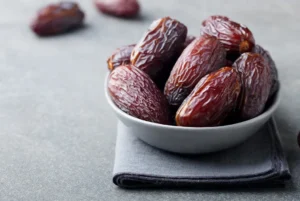“Date: a source of good health and energy”
The sun is said to be the source of all the energy in the world, but do you know the palm tree which is known as the ‘priceless tree of life’? It is one of the storehouses of energy and a priceless gift to the human body. Not only the name, but the nutritional value of this fruit has given it a unique status. It is a natural source of sugar. This delicious fruit is found not only in the Middle East, but in many countries around the world, occupying a place in the diets of most cultures for thousands of years. This extremely sweet and nutritious fruit is a blessing from the Creator.
Why eat dates?
A natural sugar source, dates contain fructose, glucose, fiber and antioxidants, which regulate blood sugar levels, relieve constipation and prevent oxidative damage to cells.
Due to the presence of vitamin B in this fruit, brain function increases. The presence of vitamins and minerals contributes to overall nutritional intake and is also helpful in providing maternal nutrition.
It contains ingredients that destroy cancer cells. This fruit contains some ingredients, which are helpful in increasing white blood cells. It is a boon that increases kidney function, strengthens bones and also helps reduce heart disease. Revitalizes the weak body.
Just four or 30 grams of dates provide about 90 calories of energy. This is why in Middle Eastern countries, where dates are available in abundance, people are able to work tirelessly throughout the day by eating dates regularly.
Is it only eaten as a fruit?”
This incredibly nutritious fruit is eaten in a variety of ways. A few dates soaked in date milk overnight turns into a thick solution in the morning, called “Nabeez”. Drinking it provides a lot of nutrients.
It was one of the favorite foods of Prophet Muhammad (peace be upon him). However, dates that have been soaked for 2-3 days should not be eaten, as it can become harmful to health. Muslims eat dates at Iftar every Ramadan as a Sunnah of the Prophet (PBUH).
Date palm seeds are also rich in nutrients. Its seeds are washed, dried and roasted until brown and blended to form a coffee-like powder, which can be consumed as a substitute for coffee. It is very beneficial and especially beneficial for cholesterol and diabetes patients.

When is it more beneficial to eat dates?
Dates can be eaten every morning 30 minutes or 1 hour before exercise, which will provide energy to the body.
In Islam, there is a hadith—
Hazrat Saad (RA) narrated that he said—
“I heard the Messenger of Allah (may peace be upon him) say, ‘Whoever eats seven Ajwa dates in the morning, no poison or sorcery can harm him that day.'”
(Bukhari: 5445; Muslim: 2047-155 Abu Dawud: 3876)
In another hadith narrated by Hazrat Ayesha (RA):
The Prophet (peace be upon him) said:
“Ajwa dates grown in the highlands of Medina contain cures for diseases, and eating them first thing in the morning is an antidote to poison.”
(Muslim: 5168; Silsilatus Sahih: 3539)
In a hadith narrated by Hazrat Abu Huraira (RA), Rasulullah (SAW) said—
“How good it is for a believer to eat Sehri with dates!”
(Abu Dawud: 2345)
Dates can be eaten in the afternoon snack or before going to bed at night. It also plays an important role in food digestion.
For whom should not eat?
Sometimes excessive consumption of dates can cause allergic problems. If such problems occur, one should refrain from eating dates.
Diabetics need to be careful, as dates are high in natural sugar (sugar), which can raise blood sugar levels.
Those who want to lose weight should keep dates less in their diet. Because dates are high in calories, it can actually help in weight gain instead of weight loss.
Conclusion:
Delicious, nutritious and rich in natural sugar, this fruit is a boon for us. It is one of the energy carriers for the human body. Dates are very useful from overcoming weakness to being an effective remedy for certain diseases. So we should keep a moderate amount of dates in our diet. Apart from ensuring good health, it also helps to keep the mind healthy. But taking too much can cause harm.
“Anything is good in moderation. Therefore, one should pay special attention to the quantity in eating dates so that harm does not occur instead of good.”





